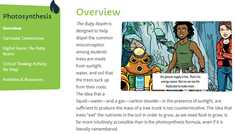Free site addresses four science topics
 The Possible Worlds digital games are designed to help improve student understanding of phenomena that are often the subject of scientific misconceptions. Developed by the Center for Children and Technology, the games are the centerpieces of modules that address four topics: photosynthesis, heredity, electricity, and heat transfer. Each module includes accompanying classroom activities that leverage students’ experiences within the games.
The Possible Worlds digital games are designed to help improve student understanding of phenomena that are often the subject of scientific misconceptions. Developed by the Center for Children and Technology, the games are the centerpieces of modules that address four topics: photosynthesis, heredity, electricity, and heat transfer. Each module includes accompanying classroom activities that leverage students’ experiences within the games.
Games are designed to:
- Help students build novel conceptual models
- Complement teachers’ existing instructional practices
- Be familiar and fun to play
Why are certain scientific phenomena the subject of persistent misconceptions? Research suggests that we develop naïve theories because the accurate versions of these concepts are difficult to resolve with our common experience of the physical world. They are counterintuitive, and thus hard for us to imagine.
The Possible Worlds games respond to that challenge by focusing gameplay on interactions with analogies for these phenomena. In each game, students interact with novel visual representations that have analogical relationships to the complex concepts at the heart of the misconception. Students then can draw on these visual analogues to help them make sense of the target concepts as they encounter them during normal instruction.
The Possible Worlds games and classroom activities are designed to supplement, not replace, teachers’ normal coverage of each topic, with the goal of improving the effectiveness of the overall instructional process. Students play the games prior to instruction. The teacher then helps students explore the significance of the in-game visualizations to the target concepts. We provide teachers with support materials to help them build explicit and accurate bridges between gameplay and goals for learning, with the aim of helping students reflect on and modify their misconceptions about these difficult science concepts.
- Friday 5: Virtual field trips - April 26, 2024
- Google, MIT RAISE launch no-cost AI training course for teachers - April 26, 2024
- 4 ways to support work-based learning - April 23, 2024
